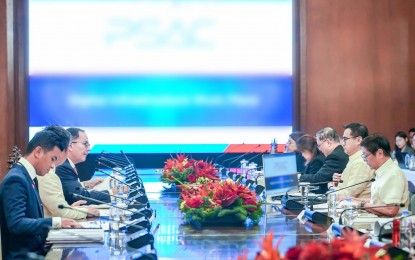
CYBERSECURITY EFFORTS. President Ferdinand R. Marcos Jr. convenes a meeting with the Private Sector Advisory Council at the State Dining Room of Malacañan Palace in Manila on Tuesday (Nov. 28, 2023) to discuss digital infrastructure work plans. During the meeting, the PSAC presented several recommendations to address prevailing challenges concerning cybersecurity breaches and strategies to strengthen the national cybersecurity program. (Photo from PBBM's official Facebook page)
MANILA – President Ferdinand R. Marcos Jr. has vowed to look for ways to ensure the immediate passage of measures that would help strengthen the country’s cybersecurity efforts, Malacañang said Wednesday.
Marcos made the commitment, after the Private Sector Advisory Council (PSAC) requested him to certify as “priority legislation” the three bills pending in the Senate, in line with the Philippine Digital Transformation Framework, Presidential Communications Office (PCO) Secretary Cheloy Garafil said.
“The President informed PSAC in a Palace meeting that he will look into those bills and see how and what can be done to move them in Congress for their eventual passage,” Garafil said in a statement.
Marcos met with PSAC Digital Infrastructure Group at the State Dining Room of Malacañan Palace in Manila on Tuesday to discuss the digital infrastructure work plans.
Garafil noted that the three bills being pushed by PSAC and are pending at the Senate include Senate Bill (SB) 1365 or the proposed Cybersecurity Act, SB 2039 or the proposed Anti-Mule Act and SBs 2150 and 2385 or the proposed Online Site Blocking Act.
“It looks like there is a great need for structural requirements in legislation. Let me work on the Cybersecurity Act, Anti-Mule and the Online Site Blocking Act. We will talk with the leadership of the Legislature and see how we can move along quickly,” Marcos, as quoted by the PCO, told the PSAC officials in a meeting at Malacañan.
The proposed Cybersecurity Act aims to institutionalize and strengthen the National Cybersecurity Inter-Agency Committee, as well as promote and increase the country’s cybersecurity resilience and improve its posture.
The proposed Anti-Mule Act seeks to prohibit money mules and other fraudulent acts involving bank accounts, e-wallets, and other financial accounts, while the proposed Online Site Blocking Bill intends to institutionalize online site blocking of websites showing pirated content to protect the creative industry and consumers against online content piracy.
The Philippines ranked fourth worldwide in the number of cyberattacks, with 3,000 cyber incidents logged from 2020 to 2022, based on the data from the Department of Information and Communications Technology (DICT).
About half of the reported cyberattacks targeted the government.
According to tech company Cisco Systems Inc.’s report, around 85 percent of companies in the Philippines recognize that cybersecurity attacks may disrupt their operations in the next 24 months.
Executive order (EO) on information security
During the meeting, the PSAC also urged Marcos to issue an EO mandating minimum information security standards for critical information infrastructure, in accordance with the National Cybersecurity Plan.
“PSAC Digital Infrastructure advocated strongly for an Executive Order mandating Minimum Information Security Standards for Critical Information Infrastructure in alignment with the National Cybersecurity Plan,” the PSAC said in a separate statement on Wednesday.
“This strategic move seeks to enhance the resilience of vital systems against potential cyber intrusions,” it added.
Critical Information Infrastructure accounted for PHP2.4 trillion in 2022, providing basic services in various sectors such as water, government, transportation, energy, banking and telecommunications, based on the PSAC’s presentation.
A 2021 DICT report showed that cybersecurity breaches resulted in 59 percent private data theft and 57 percent caused disruptions in public services.
The report also cited that 60 percent of government agencies do not have a computer emergency response team and another 60 percent of the agencies do not implement cyber hygiene activities.
The PSAC expressed full support for the DICT’s plan to establish a multi-sectoral technical working group to combat fraud and financial cyber threats, saying the initiative would focus on creating a Mobile Device Database and Anti-Financial Crimes Command Center.
The PSAC Digital Infrastructure also endorsed the upcoming Data Unity Summit and urged Marcos to deliver a keynote address.
The PSAC reaffirmed its commitment to collaborating closely with the government and stakeholders to ensure the effective implementation of its recommendations effectively.
“The aim is to elevate the country's cybersecurity posture and ensure a robust defense against evolving cyber threats,” it said. (PNA)
